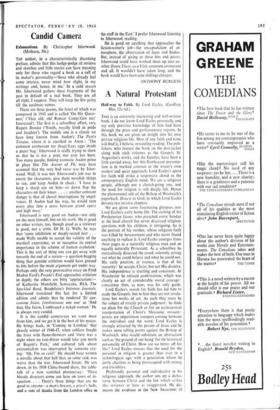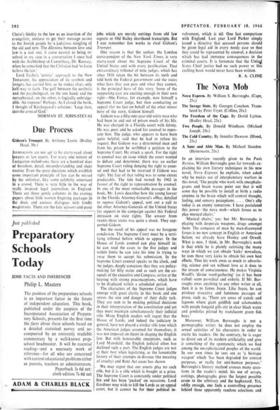A Natural Protestant
THIS is an extremely interesting and well-written book. I do not know Lord Eccles personally and my only previous knowledge of him had been through the press and parliamentary reports. In this book we are given an insight into his own private religious life. Men of any faith and none will find it, I believe, rewarding reading. The pub- lishers, who feature the book on the dust-jacket along with such volumes as the Gospels, St. Augustine's works, and the Epistles, have been a little carried away, but this flamboyant presenta- tion is in marked contrast to the writer's own modest and quiet approach. Lord Eccles's quest for faith will strike a responsive chord in the contemporary English mind. We are a religious people, although not a church-going one, and the need for religion is still deeply felt. Hence the phenomenal sale of the Bishop of Woolwich's paperback, Honest to God, to which Lord Eccles devotes two incisive chapters.
We are given some fascinating glimpses into Lord Eccles's early home life. The etching of his Presbyterian fatner, who preached every Sunday at the local church but never discussed religious questions with his children, is intriguing. So is the portrait of his mother, whose religious faith was killed by bereavement and who never found anything to replace it. Lord Eccles emerges from these pages as a naturally religious man and an equally naturally Protestant. As a schoolboy he meticulously dissected the creed, solemnly setting out what he could believe and what he could not. His early position, in essence, is that of his maturity: he accepts Christ, but not His divinity. His independence is startling and consistent. At Winchester he refused confirmation, which was clearly an act of considerable moral courage : conscience then, as now, was his only guide.
Lord Eccles's search for faith has led him to study the Gospels, but to him they are not revela- tions but works of art. As such they must be the subject of strictly private judgment: he finds no place for the Church or for an ecclesiastical interpretation of Christ's Messianic mission : priests are impertinent usurpers coming between the individual and the word. Lord Eccles is strongly attracted by the person of Jesus and he makes some telling points against the Bishop of Woolwich, who would substitute an abstraction such as 'the ground of our being' for the historical personality of Christ. How are we better off for this? Lord Eccles stresses that the need for the personal in religion is greater than ever in a technological age, with a generation whom he justly chastises as being preoccupied with money and trivialities.
Profoundly personal and individualist in his religious approach, the author sets up a dicho- tomy between Christ and the law which strikes this reviewer at least as exaggerated. He dis- misses the evidence in the New Testament of Christ's fidelity to the law as an insertion of the evangelists, anxious to get their message across to the Jewish people by a judicious mingling of the old and new. The dilemma between love and law is a real one; it came nearest to being re solved in my case in a conversation I once had with the Archbishop of Canterbury, Dr. Ramsey, when he remarked that the Christian had `to learn to love the law.
Lord Eccles's 'artistic' approach to the New Testament, his appreciation of its symbols and images, has carried him, as he makes clear, only half-way to faith. The gulf between the aesthetic and the psychological, on the one hand, and the metaphysical, on the other, is logically unbridge- able. An impasse? Perhaps. As I closed the book, I thought of Kierkegaard's solution: `Leap then, into the arms of God.'
NORMAN ST. JOHN-STEVAS































 Previous page
Previous page